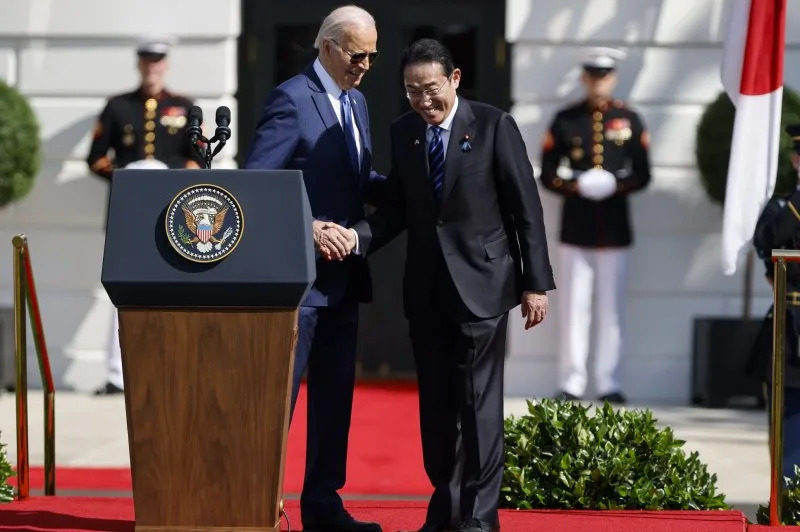The U.S. and Japan announced a historic upgrade to their security alliance Wednesday, as President Joe Biden hosts Japanese Prime Minister Fumio Kishida for an official visit that highlights Japan’s role in countering China in the Asia-Pacific.
“Through our partnership, we have strengthened the alliance. We have expanded our work together. We’ve raised our shared ambitions,” Biden said in his opening remarks at a joint news conference in the White House Rose Garden. “And now the U.S.-Japan alliance is a beacon to the entire world.”
The official visit, the first by a Japanese leader in nine years, comes amid differences between the two countries over the proposed acquisition of U.S. Steel by a Japanese company.
Kishida addressed Biden’s opposition to the deal at the news conference, saying he hoped “these discussions will unfold in directions that would be positive for both sides,” according to the translation.
“Investment from Japan to the U.S. can only increase upwards in the months and years to come,” Kishida said. “And we wish to cement this win-win relationship.”
Biden said he stands by his commitment to American workers: “I’m a man of my word. I’m going to keep it.”
On Tuesday, the Bidens welcomed Kishida and his wife at the White House before they had dinner. The Biden-Kishida summit Wednesday was followed by a formal state dinner featuring dry-aged rib-eye steak, cherry blossoms and a performance by Paul Simon.
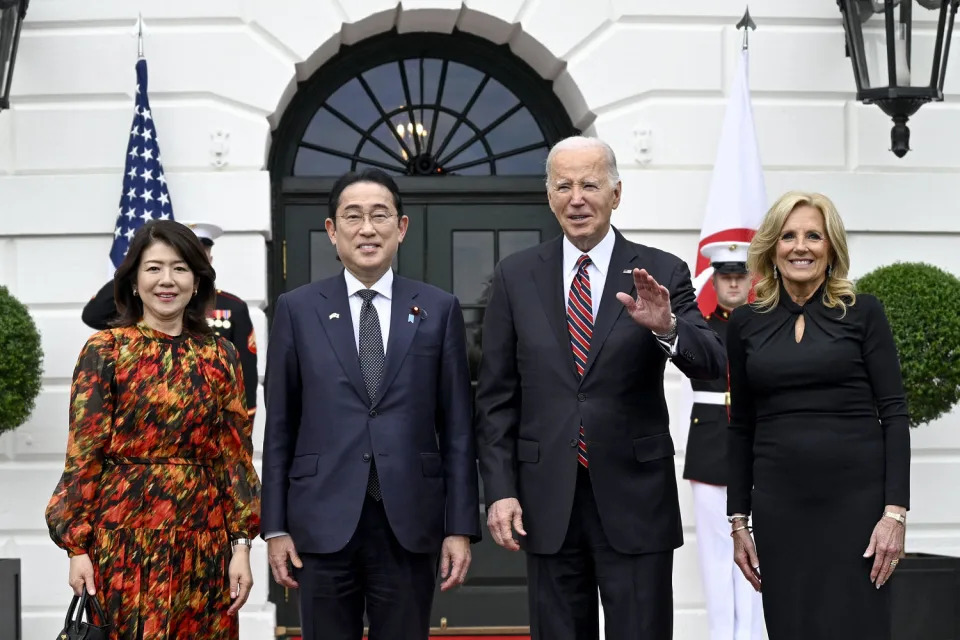
On Thursday, Kishida will address a joint meeting of Congress, becoming only the second Japanese leader to do so after Prime Minister Shinzo Abe in 2015. Then he will participate in trilateral talks with the U.S. and the Philippines that are the first of their kind.
Kishida concludes his trip Friday with a stop in North Carolina, where, according to Japanese media, he will visit the construction site of a new electric vehicle battery factory for the Japanese automaker Toyota that is expected to generate 5,000 jobs for U.S. workers.
In recent years, Japan has experienced a “sea change” in its perceptions of its security environment, as well as its role in it, said John Hemmings, senior associate director at the Pacific Forum research institute in Honolulu.
“They’ve become this sort of key enabler for the evolution of our security architecture,” he said.
Since he took office in 2021, Kishida has increased defense spending in Japan, a major shift in a country whose pacifist constitution has limited its military to self-defense since it lost World War II. Japan has also eased a postwar ban on the export of lethal weapons and has been a leader in establishing security groupings such as the Quad, which also includes the U.S., India and Australia.
The changes are driven by what Tokyo views as growing aggression by China, as well as creeping doubts about the U.S.’ presence in the Indo-Pacific and its reliability as an ally.
The U.S.-Japan summit, which is focused primarily on security, is meant to reassure Tokyo about the U.S. commitment to the security alliance, said Rana Mitter, a professor of U.S.-Asia relations at the Harvard Kennedy School.
It’s a “very public signal” that even though the Biden administration has been working to improve relations with China, it is not turning away from its allies in the region, he said.
Biden and Kishida announced plans to upgrade the U.S. military command structure in Japan, which hosts about 54,000 U.S. personnel, as Tokyo prepares for a new joint headquarters that will oversee all of its military operations. The two countries will also establish a military-industrial council to explore what kinds of defense weapons the U.S. and Japan can produce together.
The idea, Hemmings said, is to make the U.S. and Japanese militaries “much more capable of dealing with a near-peer adversary.”
The two leaders said Japan was among the countries being considered for participation in advanced capabilities projects under AUKUS, a security alliance between the U.S., Britain and Australia.
In addition, they said the U.S. and Japan would enter into a lunar exploration agreement and establish major research partnerships on emerging technologies such as artificial intelligence.
“Japan will provide and maintain a pressurized rover to support astronauts living and working on the Moon, while the United States will allocate two astronaut flight opportunities to the lunar surface for Japan on future Artemis missions,” the White House said in a fact sheet about lunar exploration agreement.
The trilateral talks with the Philippines come as the U.S. ally’s relations with China have been strained by repeated scuffles between their coast guard vessels in the South China Sea, a strategically important waterway that Beijing claims virtually in its entirety. The U.S. has said its mutual defense treaty with the Philippines would apply to such encounters, raising the prospect of U.S. intervention if they were to escalate.
On Tuesday, demonstrators outside the Chinese Embassy in Manila trampled on an image of Chinese President Xi Jinping as they protested what they called Chinese “aggression” against the Philippines in the South China Sea.
With the trilateral talks, Hemmings said, the U.S. and Japan are taking an “extremely welcome step” toward making sure that the Philippines is not alone in defending its sovereignty and that “if anything, China’s the isolated one.”
China says its actions in the South China Sea are lawful, and it accuses the U.S., Japan and others of stoking tensions in the region by forging “small circles” of powers.
Mira Rapp-Hooper, senior director for East Asia and Oceania at the National Security Council, told reporters in Washington on Tuesday that the U.S. Indo-Pacific strategy and its associated groupings and alliances “are not about being against anyone or anything; they’re about what we’re for.”
In Congress, Mitter said, Kishida is likely to argue that the U.S. is “still very much needed” in the Asia-Pacific region.
“There’s general disillusionment amongst much of the U.S. electorate with the idea of too strong a U.S. security commitment around the world,” he said. “Prime Minister Kishida, I think, will be looking to push back against that and say, no, the U.S. presence is still really very important in the region, for Japan, for South Korea, for the Southeast Asian countries.”
Hemmings said he also expected Kishida to “double down” on Ukraine as Biden struggles to win support in Congress for continued U.S. aid. Since Russia invaded Ukraine in February 2022, Kishida has warned that letting Moscow win would only embolden China in its aggression against Taiwan, a self-ruling island democracy that Beijing claims as its territory.
“I think he’s going to really make that case very passionately,” Hemmings said.
During the joint news conference, Kishida referred to China indirectly, saying, “Ukraine today may be East Asia tomorrow.”
U.S. lawmakers are also likely to be focused on the planned purchase of U.S. Steel by Japan’s largest steelmaker, Nippon Steel. Biden, who is highly dependent on labor unions for his re-election campaign, has said it is vital for U.S. Steel to “remain an American steel company.”
Senior administration officials said the dispute would have little impact on the overall U.S.-Japan relationship, which they described as “a lot deeper and stronger and more significant than a single commercial deal.”
On Monday, Japanese Chief Cabinet Secretary Yoshimasa Hayashi said Kishida was traveling to North Carolina “to convey to both Japan and the United States that Japanese companies are making significant contributions to the U.S. economy through investments and job creation.”
Biden welcomes Japan PM for state visit with eye on China
US President Joe Biden welcomed Japanese Prime Minister Fumio Kishida to the White House Tuesday, kicking off a state visit featuring a major upgrade in defense ties against a resurgent China.
A gala dinner and Rose Garden press conference are on the menu for the formal part of the visit on Wednesday, in a sign of the value Washington places on an increasingly self-confident Japan.
The two leaders are expected to unveil plans to restructure the US military command in Japan -- the biggest upgrade to defense cooperation since the 1960s -- to make them more responsive against threats in the Asia-Pacific region.
Kishida, 66, the first Japanese leader to receive full honors from a US president since Shinzo Abe in 2015, arrived on Tuesday night at the White House with his wife Yuko.
Biden, 81, and First Lady Jill Biden then took the Japanese couple to a swanky restaurant in Washington's upscale Georgetown area.
Jill Biden said the visit would "celebrate the flourishing friendship between the United States and Japan."
"Our nations are partners in a world where we choose creation over destruction, peace over bloodshed, and democracy over autocracy," she told reporters during a preview of Wednesday's state dinner.
The Japanese visit underscores the importance Joe Biden places on building alliances against countries such as China, Russia and Iran in an increasingly uncertain world.
White House National Security Advisor Jake Sullivan said the two leaders would "announce measures to enhance security cooperation, to enable greater coordination and integration of our forces."
On Thursday Biden will host the first ever trilateral summit between Japan, the Philippines and the United States to further expand alliances against China in a critical region.
But hanging over the US and Japanese leaders will be the thorny topic of a Japanese takeover of US Steel, a deal opposed by Biden as he faces a tough reelection battle against protectionist former president Donald Trump.
- 'Momentous changes' -
The formal summit kicks off Wednesday with a grand welcome including military bands, followed by an Oval Office meeting and a joint news conference between Biden and Kishida in the Rose Garden.
The Bidens will then host a gala dinner which will see the grand East Room of the White House transformed into what Jill Biden called a "vibrant spring garden."
On Thursday, Kishida will address both houses of Congress before he and Philippine President Ferdinand Marcos convene with Biden.
They are the latest Asia-Pacific allies to be hosted by Biden, who was joined by Kishida and South Korean President Yoon Suk Yeol at Camp David last August.
Biden has also moved to manage tensions with China, holding a two-hour phone call with President Xi Jinping last week and a face-to-face meeting in San Francisco in November.
According to media reports, Biden and Kishida could agree to the biggest upgrade in US-Japan command and control structures in decades.
This would make their two militaries more nimble in a crisis, for example a Chinese invasion of Taiwan, experts said.
The US has 54,000 military personnel in Japan who must report back to Indo-Pacific Command in Hawaii, around 6,500 kilometers (4,000 miles) away and 19 hours behind, for joint operation matters.
The two countries may also agree to allow large US warships to undergo repairs at private shipyards in Japan, and to joint production of defense equipment, according to media reports.
Staunchly pacifist for decades, Japan has in recent years made "some of the most significant, momentous changes" since World War II, US ambassador to Japan Rahm Emanuel said ahead of the visit.
U.S., Japan commit to new global military alliance, shared moon-landing project
President Joe Biden and Japanese Prime Minister Fumio Kishida on Wednesday announced a "historic" new military pact and cooperation on a joint space mission to send a Japanese astronaut to the moon.
"Our alliances are America's greatest asset," Biden said in the Rose Garden of the White House during a Wednesday afternoon press conference. "Our relationship with Japan is proof of that."
The United States and Japan committed to developing a network system for air and defense purposes in what Biden called "a new benchmark for military cooperation."
White House officials said the package of agreements are built on the United States' and Japan's "shared commitment to work with like-minded partners and multilateral institutions to address common challenges and to ensure a world that is free, open, connected, resilient and secure."
In announcing the bilateral defense and security cooperation between the United States and Japan, Biden -- who added that Kishida will visit a North Carolina Toyota plant Thursday -- said "our ties have never been more robust" as he noted that Japan is the top foreign investor in the United States just as Japan is the top investor in U.S. technologies.
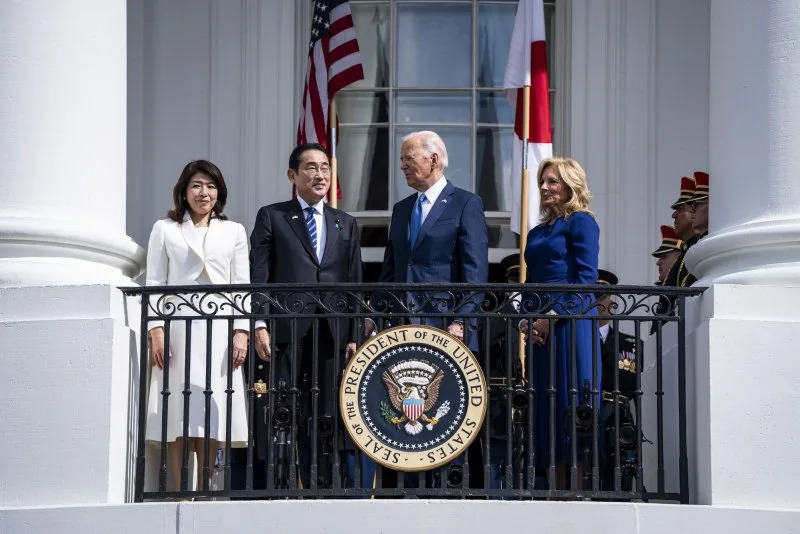
Wednesday's strengthened alliance with Japan is based on the so-called Treaty of Mutual Cooperation and Security, which Biden said "is stronger than ever."
"We affirm that our alliance remains the cornerstone of peace, security, and prosperity in the Indo-Pacific," administration officials said, adding that Biden "reiterated the unwavering commitment of the United States to the defense of Japan under Article V of the treaty, using its full range of capabilities, including nuclear capabilities."
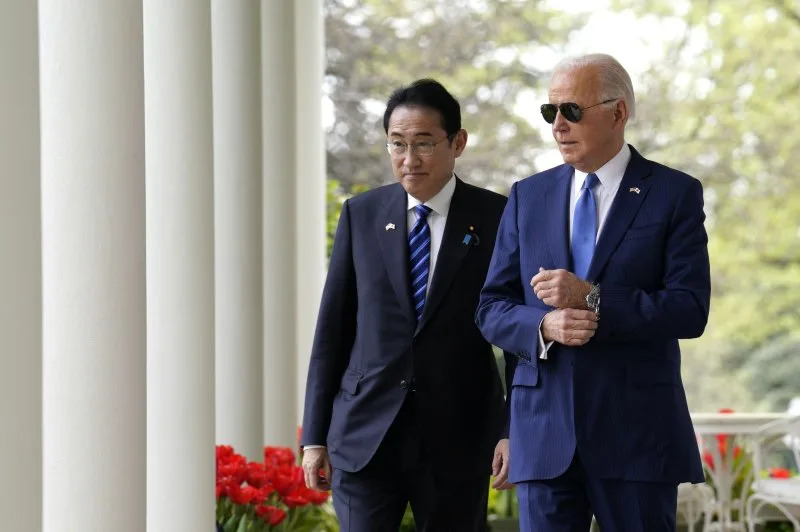
The president said the U.S. relationship with Japan "is a beacon to the entire world" and "there is no limit what our people can do" as he highlighted investments in new student exchanges "to train the next generation of Japanese-American leaders," too.
"We are at crucial crossroads," Kishida said after Biden spoke. Kishida called the alliance between the two countries "immensely important," adding that "the international community stands at a historical turning point."
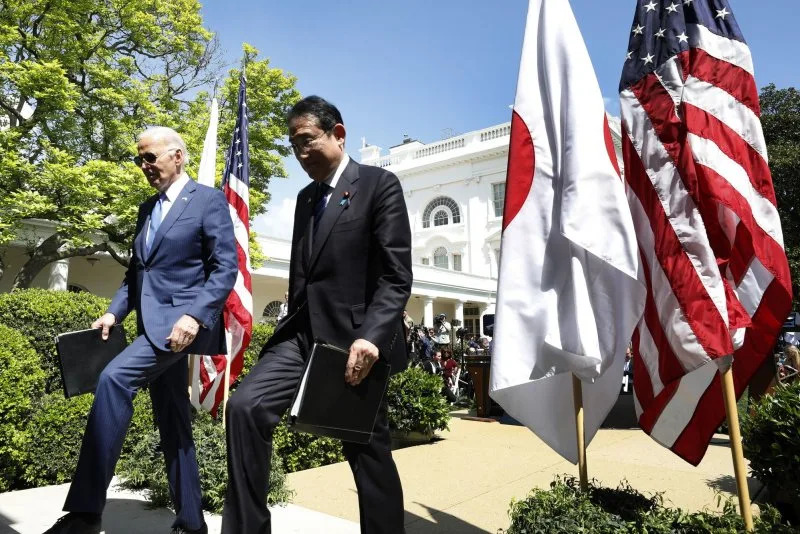
"Japan will always stand firm with the United States," said Kishida, Japan's prime minister since 2021.
Regional, global implications
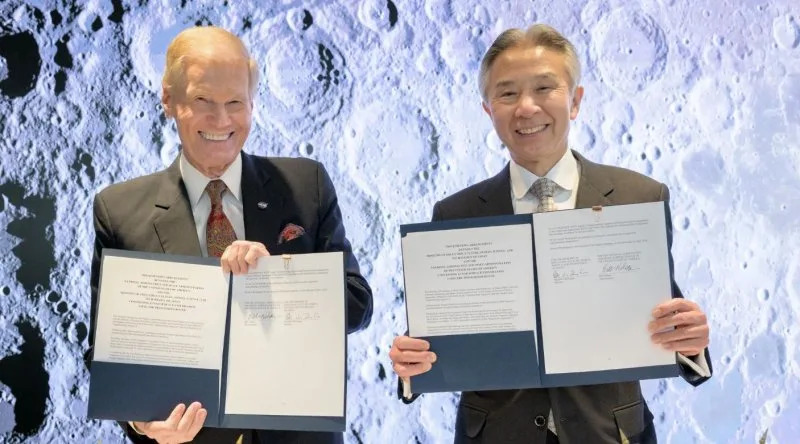
Earlier, a senior Biden administration official said up until this point, America's relationship with Japan "was largely a regional alliance," but "now a global partnership" that "could be judged as, if not our most important global alliance, then among the most important."
The two leaders also discussed a shared support for a "sustainable ceasefire" in Israel's war against Hamas militants in Gaza.
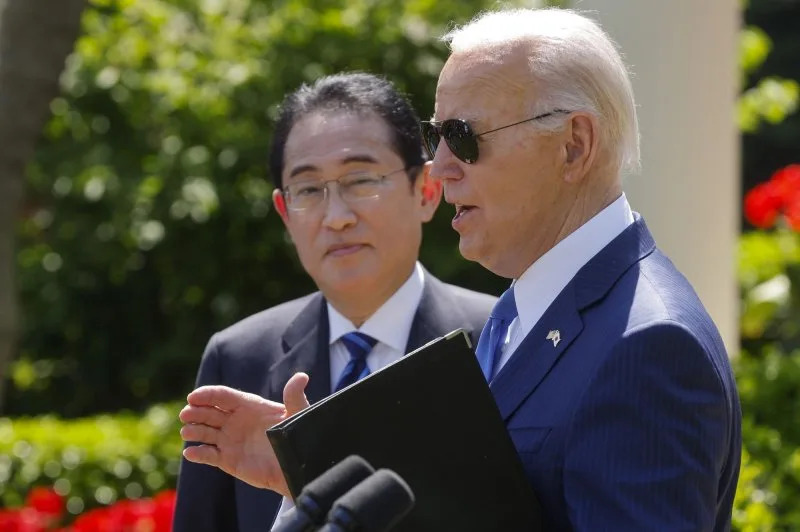
"We're going to do all we can to protect Israel's security," Biden added.
Also announced on Wednesday, Japan will soon begin talks to possibly coordinate with the United States, Australia and the United Kingdom with intelligence sharing.
Japan and the United States will handle challenges on China together "through close coordination," according to the prime minister, who also said Japan will cooperate with China "on common challenges."
"The president and I confirmed the importance of such dialogue, as well," Kishida said during a question-and-answer session with journalists after their remarks.
Kishida -- the leader of Japan's Liberal Democratic Party -- said he envisioned a "stable Japan-China relationship" that he said he wanted to see "at all levels."
A former senior Biden administration aide on East Asia said that, if China attacks Taiwan "today," Japan and the United States "would struggle to forge a combined response."
"With truly operational commands in Japan, we would have a much better ability to coordinate military operations in real time," commented Christopher Johnstone, now with the Center for Strategic and International Studies.
Peace in the Indo-Pacific region must be "based on the rule of law," Kishida said ahead of Thursday's meeting between him, Biden and the Philippine's president. He called for further sanctions against Russia and help for Ukraine, as well.
Kishida -- who served previously as Japan's foreign affairs minister before a stint as defense minister -- said Ukraine "today may be east Asia tomorrow."
Biden called the U.S.-Japan relationship "a defense alliance" and that America seeks a better dialogue with the Democratic People's Republic of Korea.
But Japan, Kishida said, has made a "significant contribution to the U.S. economy."
Moon mission plans
Biden and Kishida committed to strengthening defense forces "and other initiatives" while Biden said the United States will help Japan land "the first non-American to ever land on the moon."
There have been "huge achievements" in the area of space travel, Kishida said. He noted his excitement over space travel at the dawn of its arrival during Kishida's younger years.
As for the Artemis space program, "I welcome the lunar landing by a Japan astronaut as the first non-U.S. astronaut" to land on the moon, said the Japanese prime minister, 66.
On Tuesday, NASA administrator Bill Nelson and Japan's Minister of Education, Culture, Sports, Science and Technology Masahito Moriyama signed an agreement at NASA Headquarters in Washington, D.C., to advance human exploration of the moon.
"The quest for the stars is led by nations that explore the cosmos openly, in peace, and together. This is true for the United States and Japan under the leadership of President Biden and Prime Minister Kishida," said Nelson. "America no longer will walk on the moon alone."
Under the agreement, Japan will design, develop and operate a pressurized moon rover for crewed and uncrewed exploration. NASA will launch and deliver the rover to the lunar surface and will provide two opportunities for Japanese astronauts to land on the moon.
"With this new rover, we will uncover groundbreaking discoveries on the lunar surface that will benefit humanity and inspire the Artemis generation," Nelson added.
The pressurized moon rover will allow astronauts to travel farther for exploration and science. The mobile laboratory will accommodate two astronauts for up to 30 days as they maneuver near the lunar South Pole. NASA plans to use the rover on Artemis VII and subsequent missions.
"It was an honor to sign the historic implementing arrangement that will be long remembered as the symbol of the new era of Japan-U.S. partnership for the lunar exploration," said Moriyama.
While the specific details are expected to be worked out over the next few months between Defense Secretary Lloyd Austin and Japanese Minister of Defense Kihara Minoru, it also comes as a three-way summit is planned to happen on Thursday with Philippines President Ferdinand "Bongbong" Marcos.
"The first of its kind," Biden said Wednesday about Thursday's meeting and the growing alliance between the three countries amid escalating tensions with China.
The meeting between the two leaders come as a Wednesday night state dinner is planned to honor the Kishidas.
Strengthening defense capabilities, climate change, global diplomacy, "reaching new frontiers in space," as well as "fortifying people-to-people ties" were among the shared priorities as "the U.S.-Japan Alliance has reached unprecedented heights."
In a joint statement after their meeting outlining greater specifics of mutual goals, the White House said how "In this new era of U.S.-Japan cooperation, we recognize that global events affect the security and stability of the Indo-Pacific, and that developments in our shared region reverberate around the world."
Planting other cooperation
In addition, Japan has plans to help the U.S. with cherry blossom trees in a multi-year rehabilitation project around the Tidal Basin and West Potomac Park.
"These cherry trees, first gifted by the people of Japan to the United States in 1912, are an enduring reminder of the close bonds of friendship between Americans and Japanese," the White House said Wednesday ahead of that evening's state dinner.
Also on Wednesday, U.S. Deputy Secretary of Energy David Turk and the Japan's Minister of Education, Sports, Science and Technology, Masahito Moriyama, had unveiled a "new strategic partnership to accelerate the demonstration and commercialization of fusion energy," according to a release.
The Japanese delegation arrived in Washington, D.C., on Tuesday in preparation for Wednesday's announcement and events.



